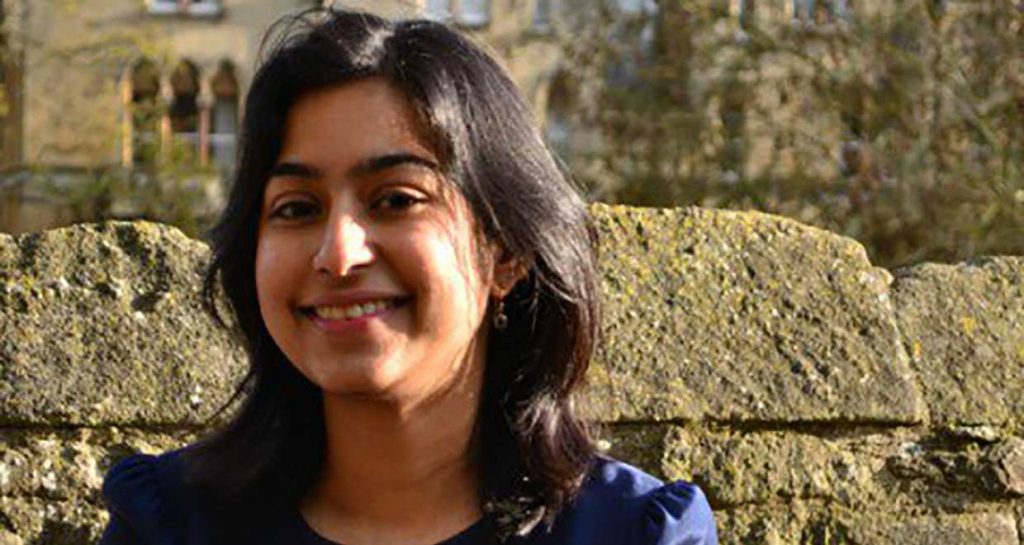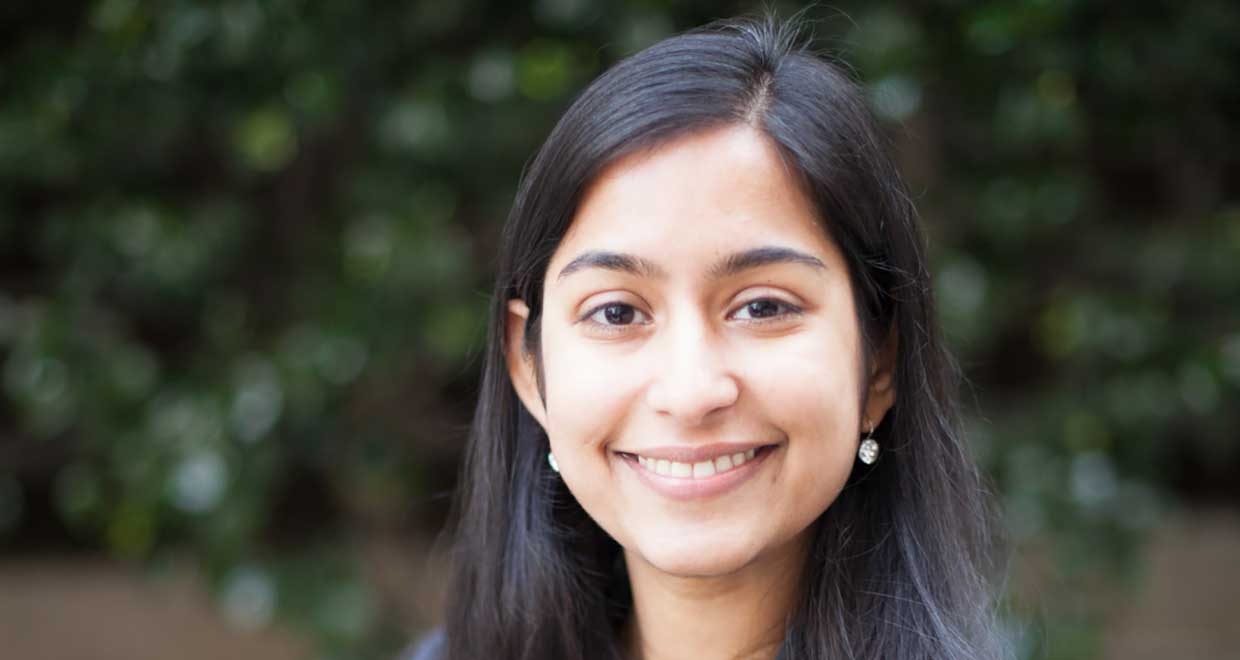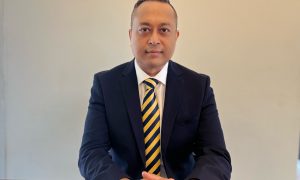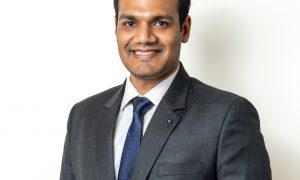Simi George graduated from NLSIU, Bangalore, in 2008. She then received her master’s degree in public administration and international development from the Harvard Kennedy School of Government in 2014. Her work is at the intersection of energy and environmental law, regulation and policy. She has transitioned from a career in corporate law (having worked with Linklaters and Clifford Chance) to her current career in policy analysis and advocacy.
In this interview we speak to her about:
- Her time at NLSIU
- Her passion for environmental work
- Her experience thus far
How would you like to introduce yourself to our readers?
I’d like to introduce myself as an energy and environmental policy professional, with an interest in many other public policy issues (too many for my own good!).
Why did you choose to pursue a degree in law?
My original plan was to study economics at the undergraduate level. The idea of pursuing a career in law hadn’t occurred to me. In fact, I’d never come across NLS. Around the time that I was preparing for my Class XII exams, my father brought along a shiny NLS prospectus. That year, they’d done a particularly good job of marketing the school. I was smitten, both by the course content (an education in law and the liberal arts (including economics!) immediately appealed to me) and the variety of opportunities that it offered. I wrote the entrance exam, and happened to make it. At the same time, I received an invitation to interview for admission to a very strong undergraduate program in economics. By then, I’d made up my mind about studying at NLS.

Is the NLU culture truly more conducive to legal education, as compared to other universities that provide legal education?
NLS was truly national in its character in that it attracted students from across the country. The opportunity to forge lasting friendships with classmates from across the country as a young adult was, in retrospect, an important early experience. That said, diversity in many other aspects was (and I believe still is) lacking, and it is heartening to see some efforts to address these challenges take root. [Editorial note: A new bill proposing 50% reservation for Karnataka students at NLSIU passed by KA state assembly could, however, change this. Read more here.]
NLS offered many learning opportunities outside the core curriculum, both at the national and international levels, and allowed access to an excellent alumni network and a very bright set of peers. I did as much learning outside the classroom as I did inside it.
I’m not familiar with the teaching model or culture at other institutions, and so I can’t comment on whether the NLU model is intrinsically better than others. I do think that because NLS is a residential school, it offers many more opportunities for learning and collaboration with peers than otherwise possible. I remember working with my classmates on moot problems, preparing for exams (including splitting up readings and sharing summaries the night before an exam), and continuing classroom debates late into the night, long after our classes had ended. My law school experience would have been very different had NLS not been a residential university.
What are the subjects that you took particular interest in, during your law school days?
I really enjoyed public law classes at NLS – Jurisprudence and Constitutional Law with Prof. U.R. Rai was one of my favorites. I also enjoyed all the foundational liberal arts classes that were taught in the first few years of the program—Economics with Prof. Somashekar, Political Science with Prof. G Ajay, and Historiography with Prof. V.S. Elizabeth. Even though it has been a very long time since I sat in those classes, I still remember them vividly. Yes, they certainly played a role in some of my career decisions, including choice of graduate program and the decision to transition from corporate law to public policy.
What activities, both academic and non-academic that you engaged in as a law student?
I’m glad that I tried out a whole bunch of co-curricular and extra-curricular activities at law school. I enjoyed mooting, and participated in quite a few national/international moots, which kept me busy throughout my time at NLS. I also dabbled in debating. Despite the lack of any talent whatsoever, I participated in several NLS inter-class dance competitions, which were always fun. I learnt something from all of those experiences, and they made for a richer law school experience. I highly recommend trying out all the extra-curricular activities that you feel drawn to, but certainly don’t believe that any of them (mooting included) are necessary experiences. I learnt a lot from mooting—the ability to think on my feet, written and oral communication skills, and research skills—but there are so many other ways in which you can pick up those skills. My sense is that things have changed in the years since I graduated, and that law students engage in a much broader variety of extra-curricular activities than my peers and I did. This is promising.
Tell us about the student exchange programme that you’d undergone and your experience at NUS.
The student exchange program at NUS was my first experience living abroad. It was a great opportunity to explore a different education system, immerse myself in a new culture, and meet law students from around the world. There was a difference in the quality of teaching. At NLS, we had a mixed bag of teachers – some were excellent, others were disappointing. At NUS, the quality of teaching was much more consistent. The quality of infrastructure and the overall administrative machinery at NUS far exceeded what NLS then had. On the other hand, it soon became clear to me that I’d taken the quality of debate and discussion within the student community at NLS for granted. Some of my best learning at NLS happened through interesting conversations with my classmates, both within and outside the classroom (everyone had an opinion!). I missed that at NUS, where the student community was somewhat narrowly focused on academic performance. On the whole, I returned to NLS with a new appreciation for everything it offered.
At what stage in one’s law school life must one pick a field to specialize in?
Having now become somewhat familiar with education systems outside India, I believe that our school system pushes students to make important career decisions too early, well before they develop an understanding of their interests, weaknesses and strengths. This is true both at the high school level, where performance in a single set of exams often determines which undergraduate institution you end up in, and also at the undergraduate level, where there is limited flexibility to choose subjects. Simply put, the system is already too rigid. I wouldn’t advise students to box themselves in further by specializing in law school. The best advice I can give is to explore as many aspects of the law as possible, whether through internships or co-curricular activities such as moots, writing, research etc. All of these experiences will give you some clarity about your interests and strengths. In the long run, that will carry you farther than any sort of specialization at the undergraduate level.
What drives your passion for environmental work?
This is not an easy question to answer. I started my career in corporate law in London. I was on a lucrative career path, working with extremely talented colleagues in a wonderful city. Yet, I found myself deeply unsatisfied. Part of what I didn’t enjoy about working in a large corporate law firm is the lack of work-life balance. My parents worked in the public sector, and had very predictable schedules throughout their careers. Because of that background, perhaps, my vision for my professional life certainly didn’t mesh well with that of a typical corporate lawyer working in an intense, high pressure environment, in which staying up all night to close a deal wasn’t uncommon. It was the desire for a more balanced and sustainable lifestyle, combined with other factors, that prompted introspection about what I really wanted to do. As I started considering alternative career paths, I found myself drawn to organizations working on public policy challenges. This was not a big revelation, but a gradual realization. It was consistent with my experience at law school, where I enjoyed public law classes much more than the private law ones and chose to do all my internships with litigators who’d specialized in some aspect of public law. My interest in public policy is broad, but I eventually ended up focusing on energy and environmental issues, which I believe are among the biggest global challenges of our time. Every job comes with a set of challenges—mine is no different—but it feels good to work on issues that I consider important.

When did you decide to pursue your masters degree at Harvard Kennedy School of Government?
I decided to apply to the MPA/ID program at the Kennedy School to transition from a career in corporate law to one focused on public policy. At the time, I was working as an associate with Linklaters in the UK. In my experience, an advanced degree can be helpful in making a career transition. The MPA/ID curriculum has a deep emphasis on economics and econometric methods. While I do not use those skills directly in my current role, my Kennedy School training has allowed me to become a critical consumer of quantitative research and analysis, which is helpful as I work closely with economists and researchers with a quantitative background.
Graduate school is not a small investment. It is absolutely critical to have clarity on why you’re picking a certain program/school, your ideal role after graduation, and the ways in which the program/school of your choice will help you get there. I can’t say that I had clear answers to all of those questions when I joined the Kennedy School. I believe that classmates who had a clearer sense of where they were headed were able to make the most of their graduate school experience. Of course, there will be intervening circumstances beyond your control. You know what they say about the best laid plans of mice and men. But, in my experience, a clear vision for one’s professional trajectory is always helpful. I certainly haven’t figured it all out, but it is work in progress.
Tell us more about your current work profile with the Climate & Energy team at Environmental Defense Fund.
EDF is an international advocacy organization based in the U.S. My work is focused on reducing methane emissions from the gas distribution sector, and advocating for changes to wholesale electric and gas market design in order to improve economic and environmental outcomes. I lead a portfolio of collaborative projects with industry under the broad umbrella of a partnership between EDF and Google Earth Outreach, manage EDF’s engagement in various regulatory proceedings before state regulatory commissions in the U.S. to advance organizational objectives, and work on issues relating to gas and electric market design in California. Undoubtedly, my legal background is a valuable asset in my current role.
If given an opportunity, what would you do differently in your career journey up to this point?
I’d worry a little less about academics, and focus a lot more on developing attributes that are critical to professional success—the art of persuasion, negotiation skills, and building a network of friends and colleagues to turn to for professional advice and mentorship. The attributes that are most often emphasized in the Indian education system are not always the ones that are critical to professional success. Too often, we mistake academic success to be a marker of future professional success. Of course, academic discipline can help develop some of the attributes and habits that needed for professional success, but in my experience, it is not a prerequisite and certainly not sufficient to succeed in the real world.
Is there any other suggestion you would like to give to our budding lawyers?
Try to make your law school experience as rich as possible, whether by trying out a range of extra-curricular activities or by proactively seeking out opportunities that aren’t necessarily offered to you at law school. In doing so, you’ll get to know your interests and strengths, and gain some clarity about where to head after law school. Good luck!
























